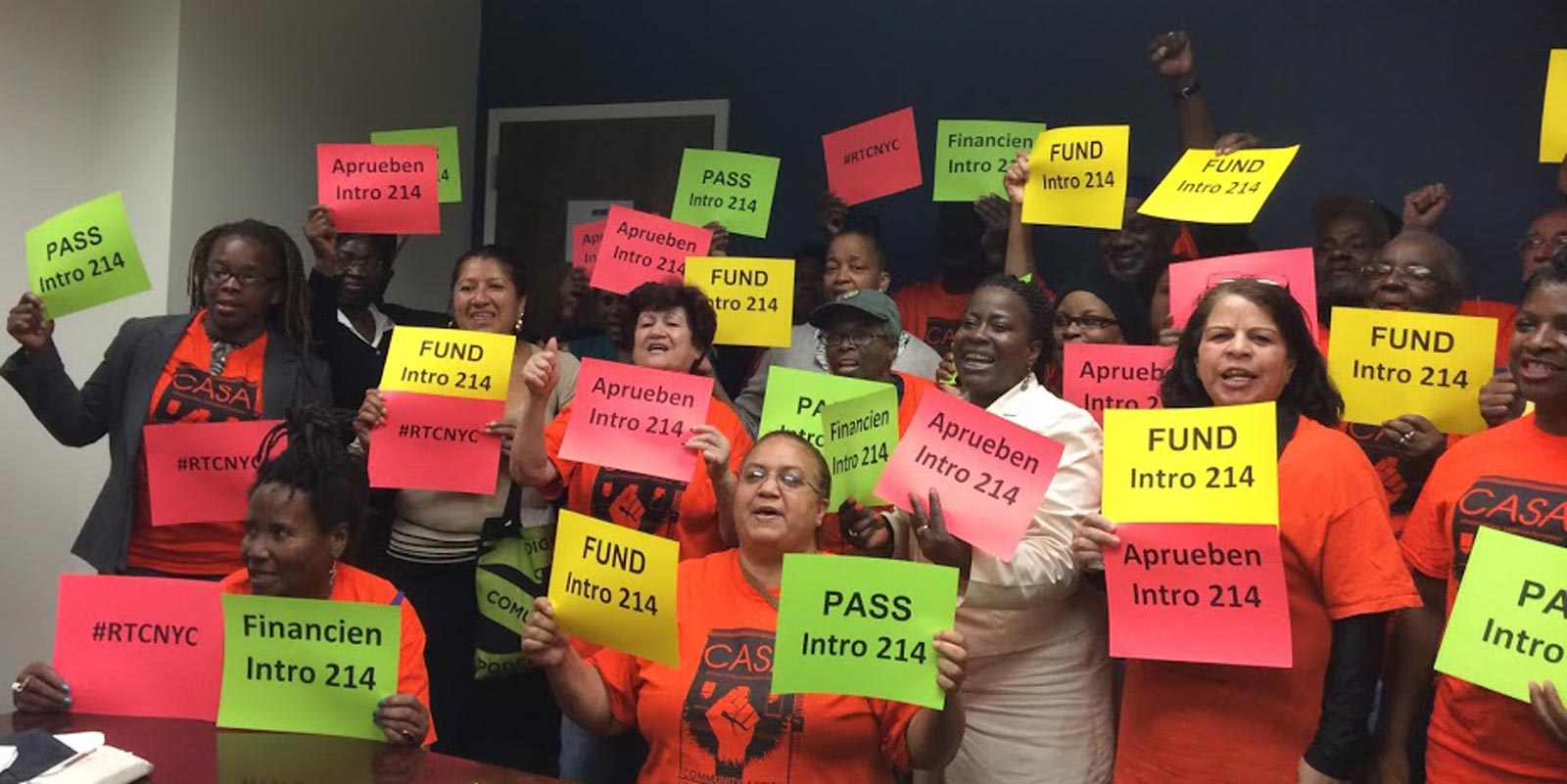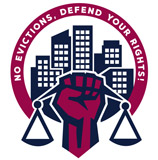
About the Authors
The Right to Counsel NYC Coalition (“RTCNYC”)
RTCNYC Coalition is made up of tenant organizing groups, tenant advocates, homeless advocates, senior advocates, disability advocates, academics, legal services organizations and more! We led the campaign that resulted in the passage of Local Law 136, which ensures that low-income tenants are represented in eviction cases by attorneys when they defend their rights and their homes. The Coalition is actively organizing and advocating while this law is being phased in.
In 2014, the Right to Counsel Bill (Intro 214) was introduced in New York City Council in order to establish a city-funded right to counsel for low-income tenants facing eviction proceedings. After three years of organizing, the Right to Counsel was signed into law in August 2017: mandating universal access to legal representation for low-income tenants and making NYC the first city in the country to establish a right to counsel for tenants facing eviction. This means that tenants no longer have to fear unjust evictions. This means that tenants no longer have to fear eviction as retaliation for organizing in their buildings or holding their landlords accountable. This means that we have more tools to fight gentrification and displacement. The law is being phased in over 5 years. By July 2022, all low-income tenants in NYC will have a right to an attorney to defend their homes.
The Community Development Project (“CDP”)
CDP strengthens the impact of grassroots organizations in New York City’s low-income and other excluded communities. CDP’s Research and Policy Initiative partners with and provides strategic support to grassroots community organizations to build the power of their organizing and advocacy work. CDP utilizes a Participatory Action Research model in which low-income and excluded communities are central to the design and development of research and policy. CPD’s work consists of the following: Participatory Action Research support and report development; grassroots policymaking; popular education curriculum design and training; facilitation of strategic alliances and coalitions; and strategic campaign research.
About the Toolkit
This toolkit is designed by the RTCNYC Coalition, with community organizing campaigns in mind. Organizing won us the Right to Counsel in New York City. Community members and organizers strategized, campaigned and agitated for years to make this new law a reality. And the organizing continues: to improve and strengthen the law, and to ensure it is implemented in the strongest possible way.
These tools are for organizers and community members fighting evictions, displacement and gentrification pressures, and seeking to advance the right to counsel in their own communities. We know every campaign will be different, because local contexts differ as does the organizing landscape. You may be just starting to think about what it would take to initiate such a campaign, or you may be most of the way there already. The tools, templates and examples we provide are intended to be adapted and modified to fit your needs.
How to use the Toolkit:
We invite you to start to tackle the toolkit by reading the Lessons from NYC’s Right to Counsel Campaign; this document was the impetus for the toolkit and it doubly serves as a summary of the campaign. Starting here can help you decide which tools will work best for your campaign.
You can read the toolkit the whole way through or pick and choose the pieces that are most relevant to your campaign. The toolkit is laid out in sections that follow one another, but we know that campaigns are not linear. Building your coalition may start early but continue throughout your campaign, and your needs and goals will change over time. You may have early moments where you seek to gain media attention and apply public pressure, and later moments where you are focusing on internal base building and research. We offer these tools to be used when you need them and in the ways that you need them.
- Activities: The activities included in the Toolkit are meant to be done in group settings to get the energy flowing and turn community voices into action and progress.
- Tools: We turned our work into usable tools and templates that you can download, print and start using right away.
- Reports and Essays: These are intended to provide context and framing for specific legal and organizing issues.
- Webinar: Check out this video of a 1 hour webinar that provides an overview of the toolkit, why we made it, how to navigate it and answered key questions from participants. .
Sharing this toolkit is possible because we documented almost every step of our campaign, and we urge you to document the work of your coalition/organization as it is in progress. We found video to be particularly helpful. This way you can use your work not only in the moment but can continue to capitalize on it in the future. As you will see, we found ways to use things multiple times, such as hosting a forum, creating a video from that forum to reach a wider audience, and then using a transcription of the video to write a report which we could then release, creating a new opportunity for press and public engagement.
We documented as much of the organizing process as we could, but because the toolkit was developed after the fact, there are surely steps we forgot, pieces that are missing, and information we can’t share on the internet. Also, we developed the toolkit while running the campaign for a just implementation, which means that the section on implementation is incomplete because it’s still in progress. We may or may not update that section as we go, but we wanted to add at least a few key things we’ve done so far to help folks think about implementation in the context of a campaign. That being said, this toolkit isn’t meant to be something you follow, or a prescription –it’s just meant to be useful. Take what works for your coalition, leave what doesn’t apply, and definitely make it better! Lastly, please be in touch! If something works for you and is particularly powerful, we’d love to hear about it! If something doesn’t work at all or if you create something new, which you hopefully do, we’d love to hear about that too!
We offer this toolkit to the tenants’ rights movement, as a way to fight for housing as a human right and to help combat the waves of gentrification that are displacing low-income communities of color across the country.
To learn more about our work, visit our website, sign up for info or email us!
Acknowledgements
Thanks very much to the folks at the Community Development Project, especially Alexa Kasdan, Erin Markman, Zarin Ahmed and Irene Linares who created all of the templates and tools, went through all of our unorganized material and made this toolkit possible. Thank you also for your deep belief in and commitment to organizing throughout the process. Many thanks to Inga Manticas for transcribing a panel we did that helped create the profiles. Deep thanks to Marika Dias, Randy Dillard, Lorena Lopez and Maria Lopez Nunez for your leadership, incredible persistence and your love for this work and for sharing that with everyone that sees this, in your profiles. And of course thank you to all of the members of the coalition, particularly the tenant organizing groups like CASA, Flatbush Tenant Coalition, Catholic Migration Services, Northwest Bronx Community and Clergy Coalition, Goddard Riverside Community Center, for documenting all of your amazing work, for responding to multiple requests for pictures and news coverage so that this toolkit could be possible. And of course this toolkit wouldn’t be possible without every single active member of the coalition who fought to win this campaign and who continues to fight to ensure a just implementation and ensure that it’s one step towards housing as a human right and a more just city.
